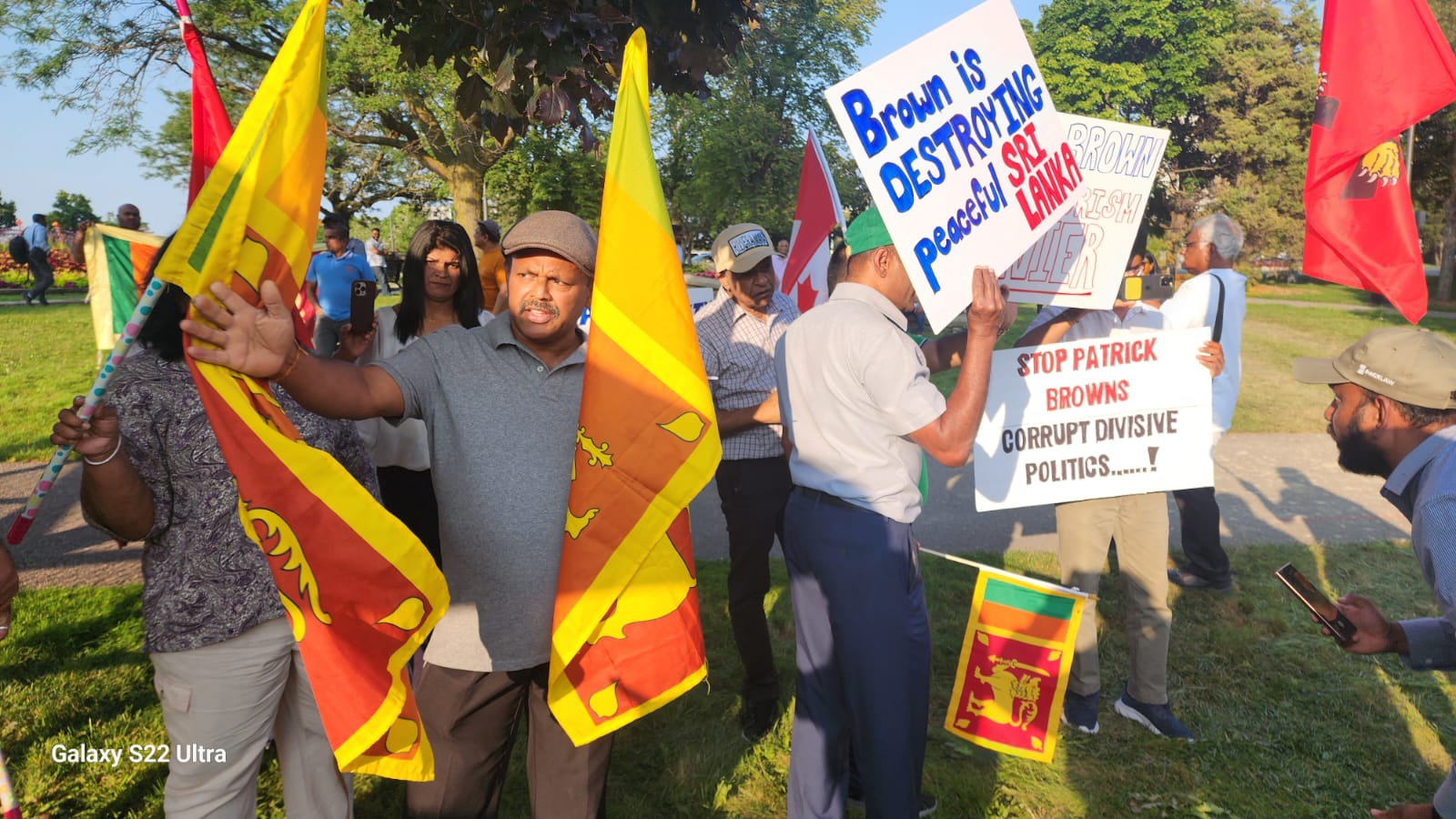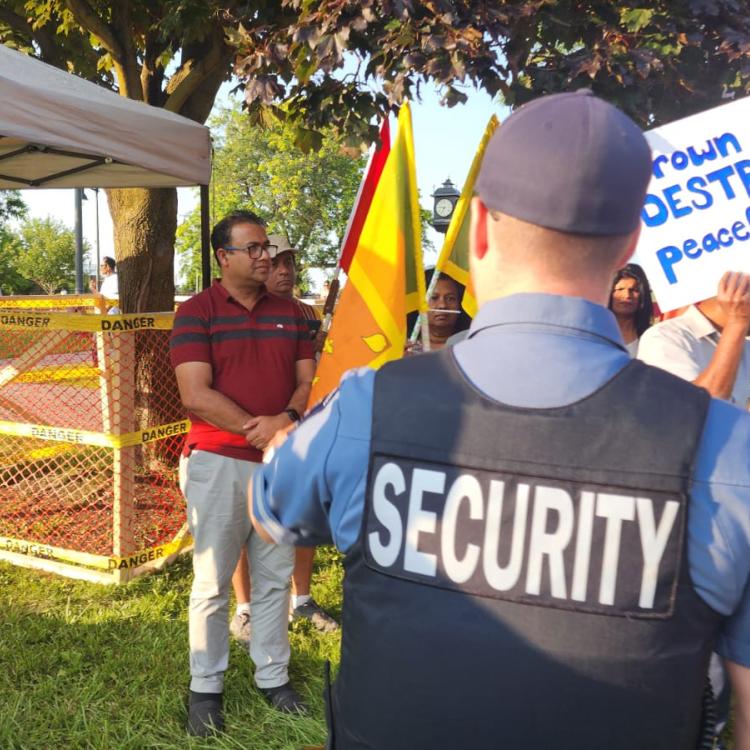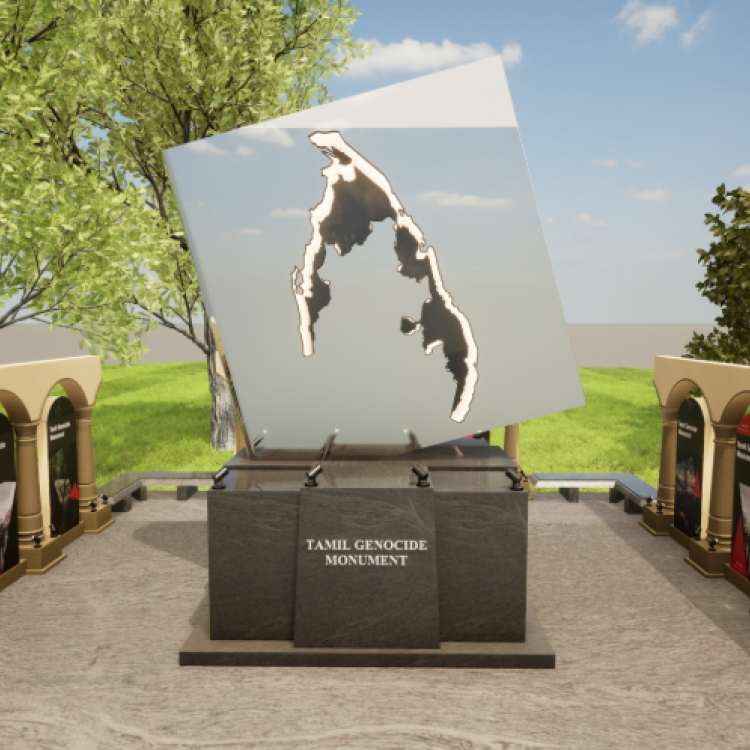
A Sri Lankan protestor attempts to obstruct a Tamil genocide memorial event in Canada in August.
The Tamil Rights Group (TRG) was granted official standing by Canada’s Foreign Interference Commission following private consultations with its commissioner, where it spoke out against the surveillance and intimidation of Tamil activists by the Sri Lankan government.
TRG took part in a critical public consultation panel alongside other diaspora organizations to address growing concerns over foreign interference in the affairs of diaspora communities in Canada. The panel sought to provide insights on how Canada could effectively counter such interference, particularly from foreign governments like Sri Lanka.
During their submission, TRG said it highlighted the “alarming tactics employed by the Sri Lankan government to target Tamil Canadians”. These tactics include surveillance, disinformation campaigns, smear attacks, and the intimidation of activists. According to TRG, such actions pose a serious threat to the community’s pursuit of justice and accountability for the genocidal crimes committed against Tamils by the Sri Lankan state.
The concerns come after it was recently revealed that Sri Lanka’s Consul General in Toronto, Thushara Rodrigo, has formally written to the Mayor of Brampton, Patrick Brown, in an attempt to halt the construction of a memorial dedicated to the victims of the Tamil genocide. The letter, sent in May 2024 and exclusively released by the Tamil Guardian, claims that the monument would “severely disrupt communal harmony” in Canada and conveys what the Consul General described as a “deeply distorted and false message of violence.”
The move by the Sri Lankan government has sparked further outrage, as it continues to deny responsibility for the atrocities committed against Tamils during Mullivaikkal genocide in 2009. Despite overwhelming evidence—including the mass killings of tens of thousands of Tamil civilians, the targeting of hospitals, widespread sexual violence, and the execution of surrendering Tamils on camera—Sri Lanka refuses to acknowledge or account for the atrocities.
In response to such ongoing denials and interference, TRG presented six key recommendations to the Foreign Interference Commission, emphasizing the need for Sri Lanka to be held accountable and for Canada to protect its citizens who advocate for justice. The recommendations are as follows:
1. Public Education on Foreign Interference: Empower Canadian communities to identify and respond to foreign interference, ensuring that advocates are aware of the resources available to confront these threats.
2. Enhanced Accountability: Strengthen existing sanctions and introduce additional measures targeting Sri Lankan officials responsible for human rights abuses.
3. Support for Independent Investigations: Continue backing the UN Human Rights Council’s efforts and reinforce the Sri Lankan Accountability Project (SLAP) mandate to investigate human rights violations.
4. Referral to International Courts: Utilize international law mechanisms to hold Sri Lankan officials accountable for war crimes, crimes against humanity, and genocide by referring cases to the International Criminal Court (ICC) and the International Court of Justice (ICJ).
5. Utilization of Universal Jurisdiction: Encourage legal action against war criminals in Canada through the principle of universal jurisdiction, allowing them to be prosecuted regardless of where the crimes occurred.
6. Formal Recognition of the Tamil Genocide: Advocate for the official recognition of the Tamil genocide both within Canada and on international platforms.
These recommendations reflect the urgent need for accountability and justice for the Tamil people, particularly in light of ongoing efforts by the Sri Lankan government to deny its role in the atrocities and interfere with Tamil advocacy abroad.


